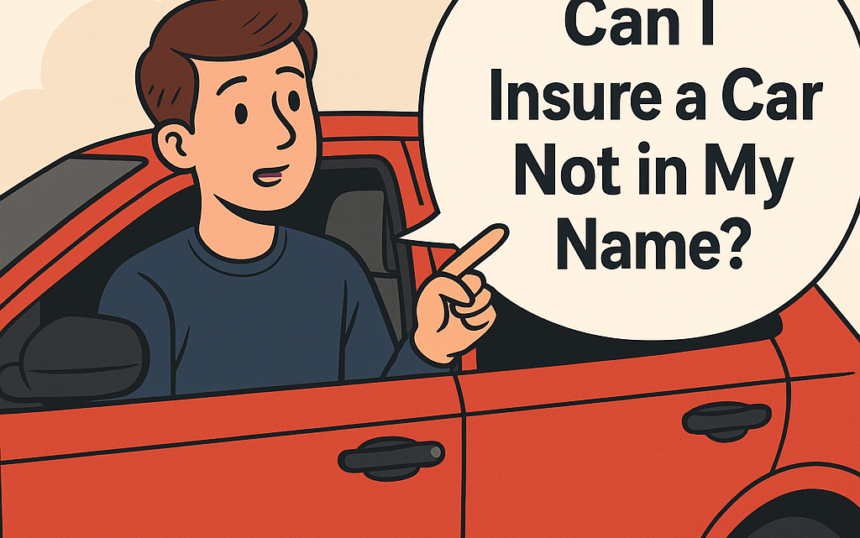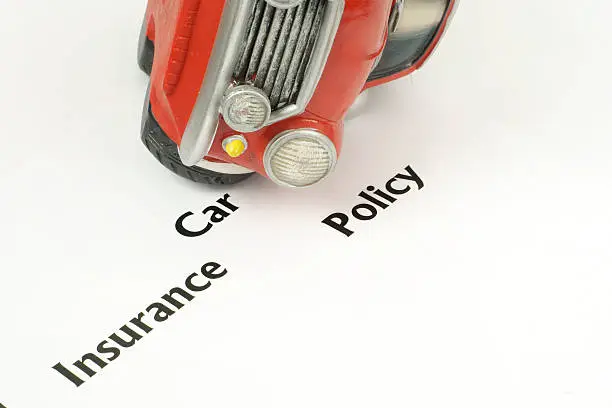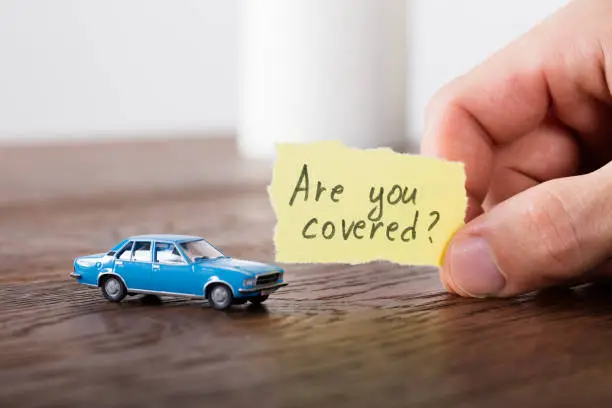
Can I Insure a Car Not in My Name? Everything You Need to Know2025
Yes You can insure a car that is not in your name but it depends on what you have to do with the car, the rules and how you enter it in your policy
Have you ever wondered if you can insure a Can I Insure a Car Not in My Name but how can you name it? You are not alone. We will guide you through what it really means to insure a car and whether it is even legal to do so
Now we will teach you the important difference between owning a car and insuring it. What insurance companies require if you are not the owner. Great ways to get cover like becoming a named driver and if you try to follow the rules. The real risks are here. From legal tips to money saving tips.

What Does It Mean to Insure a Car Not in Your Name?
Imagine this: you’re driving your mom’s car every day to work or school. You don’t own it. Your name is not on the car papers. But still, you want to protect it just in case something bad happens, like an accident.
So, the big question is can you get insurance on a car that’s not yours? To answer this, we first need to understand two simple things: what it means to own a car, and what it means to insure one.
What Is Car Ownership vs. Car Insurance?
- Car ownership means your name is on the car title. That’s the paper that says, “This car belongs to YOU.”
- Car insurance is like a safety shield. It helps pay for damage if the car crashes, gets stolen, or causes harm to someone else.
Now here’s the twist: you don’t always have to be the owner to drive a car. But when it comes to insurance, things get tricky.
Insurance companies usually want to protect the person who has something to lose from the owner. If you’re not the owner, they may wonder, “Why are you insuring this car? What’s your connection to it?”
That’s why it’s important to understand your role with the car are you borrowing it? Driving it regularly? Taking care of it like it’s your own? These things matter a lot to insurance companies.
Why Would Someone Want to Insure a Car They Don’t Own?
Great question There are many real-life situations where people want to do this. Here are a few simple examples:
- You’re driving your parents’ car every day. Maybe you’re a student or just learning to drive. The car is theirs, but you’re using it all the time.
- You’re borrowing a friend’s car for a long trip. You want to be safe and make sure it’s covered.
- Your partner gifted you a car, but it’s still in their name. You feel like it’s yours but legally, it’s not.
- You’re using a company or work vehicle. It’s not your car, but you’re responsible while driving it.
In all these cases, you might want to insure the car yourself, especially if the owner doesn’t have proper coverage, or you just want extra protection.
So yes this question isn’t strange. It’s actually very common.
Is It Legally Allowed to Insure a Car You Don’t Own?
Now, this is where things get a little serious (but don’t worry we’ll keep it simple).
In most places like the United States and Canada, insurance companies have rules about this. And one big rule is this: they want you to have what’s called an “insurable interest.”
What Do Insurance Companies Usually Require?
Insurance companies are in the business of risk. They ask:
“If we give you this insurance, and the car gets damaged will YOU actually lose something?”
If your answer is yes, that means you have an insurable interest.
💡 Insurable interest means:
You have a real reason to care about the car. If something bad happens to it, it will hurt you financially or personally.
Examples:
- You drive the car daily.
- You maintain it.
- You depend on it to get to work or school.
So, even if your name is not on the title, insurance companies may still let you get insurance if you can prove that you truly depend on the car.
But remember: every insurance company is different. Some are strict, some are flexible.
Are There Any Exceptions to This Rule?
Yes! And this is where things get interesting.
Here are some common exceptions where insurance companies might allow you to insure a car that’s not in your name:
- You’re a family member living in the same house. For example, a son driving his dad’s car every day.
- You have a signed agreement with the owner. Something in writing that says, “Hey, this person can use and insure my car.”
- You’re leasing the car from someone. Even if the car is not legally yours, you still care about it because you’re responsible.
- You’re added as a co-owner or co-insured person. This is the safest way both your names go on the insurance policy.
Each of these cases shows the insurance company that you have a real connection to the car.
⚠️ But be careful: If you lie or hide the truth, the insurance might not work when you need it most. Always be honest about who owns the car and who drives it.

What Are the Different Ways to Get Insurance on Someone Else’s Car?
You’re not the car owner but you drive it every day. Maybe it’s your partner’s car, your best friend’s, or even your grandma’s. So how do you protect yourself and the car? Don’t worry you’ve got options.
Let’s look at the smartest and safest ways to make sure you’re legally covered and financially protected.
Get Added as a Named Driver on the Policy
This is the easiest and most common way to get covered.
A named driver is someone who is listed on the main car owner’s insurance policy. It tells the insurance company:
“Hey, this person also drives the car, and they should be protected too.”
Let’s say your mom owns the car. She can call her insurance company and say:
“I want to add my son as a named driver.”
Boom. You’re now legally allowed to drive the car with insurance protecting you.
👉 Good to Know:
- This works well if you drive the car sometimes or regularly.
- The owner still holds the policy, but you’re covered while driving.
- It’s often cheaper than getting your own policy.
But remember: if you start driving the car more than the actual owner does, the insurance company might not like that. It’s called “fronting” and it can get you in trouble.
Ask the Owner to Add You as Co-Owner or Co-Insured
Now, if you drive the car every single day, and you take care of it like it’s yours this might be your best move.
You can ask the real owner to add your name to the insurance policy as a co-insured person or even as a co-owner.
Here’s how it helps:
- It tells the insurer: “Two people are responsible for this car.”
- It’s great for long-term shared use like spouses, roommates, or partners.
- You can help share the cost of insurance and have more control.
Pro Tip
Some insurance companies even let you both split the premium, especially if both of you have clean driving records.
But be honest. Don’t pretend to be a co-owner just to get insurance it can backfire. Always tell the truth about who owns the car and who uses it most.

What Are the Risks or Problems If You Insure a Car Not in Your Name?
At first, insuring someone else’s car might seem like a quick fix. But if you’re not careful, you could end up with no coverage at all, even after paying for it.
Here are some of the most important risks you need to know before moving ahead.
Claims Can Be Denied If You’re Not the Legal Owner
Here’s the hard truth: insurance companies don’t like surprises.
If they find out that:
- You insured a car pretending it’s yours…
- Or you didn’t tell them who the real owner is…
They can refuse to pay your claim.
Imagine you get into an accident and your insurance company says:
“Sorry, we’re not paying. You weren’t honest about ownership.”
That’s not a situation you want to be in.
⚠️ Important:
- Always tell the insurance company who the real owner is.
- If you’re not the legal owner, make sure they know your real relationship with the car.
Being honest upfront saves you from a lot of pain later.
You May Pay More or Get Limited Coverage
Even if you do manage to get insurance, there are still some downsides:
- Higher Costs:
Insuring a car you don’t own is seen as a higher risk, so your premium (monthly payment) may go up. - Limited Protection:
Some insurers only offer basic coverage to non-owners like liability insurance. That means:
- It pays if you hurt someone else or damage their car.
- But it won’t fix the car you’re driving, even if it’s badly damaged.
- It pays if you hurt someone else or damage their car.
- No Benefits for Your Driving Record:
If you’re not listed as the main policyholder, any safe driving rewards or discounts might go to the car’s owner not you.
💡 Solution?
Work with the car owner and be fully transparent with the insurance company. Ask about the best way to protect yourself properly while staying within the rules.


